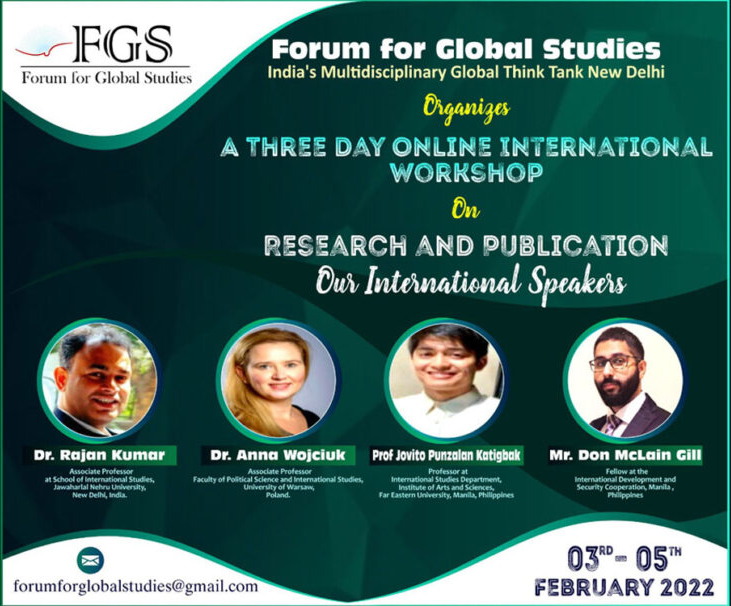On 23 February 2022, the Forum for Global Studies, New Delhi, a multidisciplinary global think tank, hosted a lecture on Research Methodology by Dr. Rajan Kumar, Associate Professor at JNU, New Delhi. This was a part of the Three day online international workshop on Research and Publication which was being conducted by the Forum for Global studies. He started by providing a brief overview into the field of research methods in social sciences. The presentation was about 5 major aspects of research methodology namely, basic concepts and types of research, philosophical traditions in research methods, research designing and biases in research. The lecture began by stating that research is originated from the French word ‘recherche’. He pointed out that research essentially means presenting a complex reality in a simplified and comprehensive manner based on observation and logical inference. Dr. Kumar explained that researcher is essentially a master chef who starts with what is called imagination theory then looks for his data which are his ingredients and then goes on to apply the rules of cooking which is the research methodology. Finally, this meal must be vetted by others meaning the research must be evaluated by independent scholars.
He then proceeded to elaborate on some basic concepts in research namely variables, validity & reliability, methods of inference, correlation and causation, necessary and sufficient conditions equifinality, object and subject distinction and finally different types of biases in research like selection bias, omitted variable bias, multicollinearity, ideological and problem of endogeneity. The lecture further elaborated on different types of research namely exploratory, which is the initial research to identify the problem and pattern, descriptive, explanatory, and interpretive / narrative / discourse-based research. Dr. Kumar explained the utility of each type of research in different fields of Academia. He briefly touched upon the positivist and constructivist philosophical traditions before proceeding to explain the 2 components of research namely on ontology & epistemology and secondly their analytical applications and methodology. He elaborated that ontology is the understanding of what constitutes reality and how can we understand its existence and epistemology stands for the understanding of basic knowledge and methods to obtain it. Finally, he stated that methodology is basically strategies and techniques to get to the reality. In the latter half of the presentation, he elaborated on various aspects of ontology namely objectivist, subjectivist, critical realism, and their application.
Following this, epistemology, or the method of getting to objective reality was elaborated by Dr. Kumar wherein he explained that epistemology comprises of intuitive, authoritative knowledge, analogy–metaphor, logical inferences which are inductive and deductive and empirical. He explained about how are they applied experientially, through literature reviews and observational inferences. He briefly touched upon the process flow of a scientific research which, he explained, comprises of research question, review of literature, theory and its explanation, hypothesis, data collection hypothesis testing and finally, a report of findings.
He further elaborated on major components of a scientific research design which are framing the critical question, theory/generalization, estimating the data type required and finally scientific analysis of data. Towards the end, he recommended a book by King Cohen and Verba (1994) on improvising research designs and emphasised that improvising research design comprises of improving the research question and its theory, data quality and data use which leads to validation of measurement and minimising of biases. He explained the process of framing a research question which comprises of asking questions that are socially relevant, novel, challenging, established notions and extrapolation of methods which are interdisciplinary. He recommended that while in improving theory certain points must be kept in mind like scientific theories always being falsifiable, keeping theory inclusive of as many observable implications as possible, internal logical consistency understanding it in comparison with other existing theories. He further elaborated that framing hypothesis comprises of identifying variables and deducing speculative link between them. Dr.Kumar explained that hypotheses are usually of 3 types namely, simple testable statement, causal hypothesis, and comparative hypothesis.
Towards the end of his lecture Dr. Kumar touched on the data aspect of research methods. He explained what primary and secondary data is and elaborated on qualitative and quantitative data. He also explained methods of data collection like experimentation apart from direct and indirect observations. He also touched upon the tools that need to be learnt to effectively analyse data before concluding his lecture. This presentation was followed by a question–answer session in which Dr. Kumar was asked questions about the concept of falsifiability of theory, important tools and journals, and bias in research conducted among vulnerable sections of society. Dr. Kumar began by addressing the confusion of a student regarding empirical research being falsifiable. He emphasised that the theory must be falsifiable else it may become tautological citing philosopher Karl popper. He said that the theory should be framed as falsifiable and pointed to the distinction between verification and falsifiability and the theory should be backed by data to prove it either way, else it cannot be a called a falsifiable theory. He recommended American and British Political Science Journals besides the Economic and Political Weekly as credible journals to learn from and recommended that research students must learn tools like SPSS and excel. Regarding bias in social sciences research on weaker sections, Dr. Kumar pointed at minimising ethno-centric biases by not getting affected by personal value systems during the research. He pointed to methods like ethnography and participant observation methods to reduce it.

